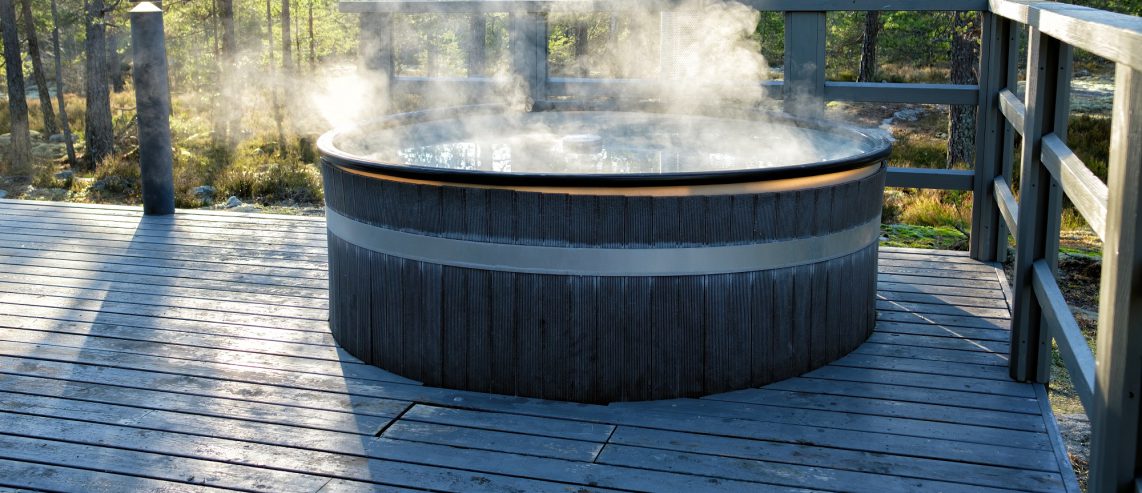When you’re suffering from the minor discomforts of pregnancy, it’s normal to look for ways to relax. And a soak in a hot tub might sound like the perfect way to ease your aches and pains. But it may not be the safest for you and your developing baby.
Here’s what you need to know about the risks of using hot tubs while pregnant and some better alternatives.
Is It Safe to Use Hot Tubs While Pregnant?
There’s not much research on the safety of using hot tubs while pregnant. Most experts don’t expressly forbid using a hot tub if you’re expecting. However, the American College of Obstetricians and Gynecologists recommends against it.
That’s because using saunas, steam rooms, and hot tubs in early pregnancy could potentially cause congenital disabilities in the developing fetus. The risks are most significant in the first 12 weeks of pregnancy when the baby’s brain and spinal cord develop.
Here’s why you should be careful: The temperature in a hot tub can be as high as 104 F. Sitting in a hot tub for an extended period can raise your core body temperature (hyperthermia). Anything that raises your core temperature to over 101 F may harm your growing baby.
You could have similar problems from sitting too long in a hot sauna or steam room.
Never Miss a Beat!
Subscribe to Our HealthBeat Newsletter!
Thank you for subscribing!
You can now select the specific newsletters you'd like to receive.
You are already subscribed.
Subscribe to more newsletters in our email preference center.
Sorry, an error occurred. Please try again later.
Get Healthy Tips Sent to Your Phone!
What Are Potential Problems from Being in a Hot Tub While Pregnant?
Some of the possible complications from soaking in a hot tub when you’re pregnant include neural tube defects, dehydration, and fainting.
Neural tube defects
Neural tube defects are congenital disabilities of the brain, spine, or spinal cord. They happen in the early weeks of pregnancy — sometimes even before you know you’re pregnant.
The two most common neural tube defects are spina bifida and anencephaly.
Spina bifida happens when the baby’s spinal column doesn’t completely close. It can lead to nerve damage and paralysis of the legs.
Anencephaly happens when the brain and skull do not develop properly. Babies with this condition are usually stillborn or die shortly after birth.
Dehydration
If your temperature gets too high, your body tries to cool itself by sweating. You can become easily dehydrated if you don’t drink enough fluids while you’re in a hot tub. Immersed in hot water, you may not even realize how much you’re sweating — and how much fluid you’re losing.
Pregnant women are already at a greater risk of getting dehydrated. They need more fluid than the average person. Dehydration during pregnancy can lead to low amniotic fluid and even premature labor.
Fainting
When you get overheated, more blood flows to your skin to help cool your body by sweating. Less blood reaches your internal organs, brain, and developing baby. When there’s a drop in blood flow to the brain, you may faint and could risk drowning.
Lack of blood flow can interfere with your baby’s normal growth and development.
How Can You Reduce Your Risk if You Use a Hot Tub During Pregnancy?
It’s best to err on the side of safety when you’re pregnant. But if you find the lure of a hot tub or sauna too much to resist, you should take the following precautions.
- Check with your doctor first.
- Get out of the hot tub if you start feeling dizzy, have pain, or your hands or feet tingle.
- Have another adult with you, as you would when swimming.
- Instead of immersing yourself, dip your feet and lower legs into the hot tub.
- Limit your time. Use a hot tub or sauna for no more than 10 minutes.
- Set the water (or sauna) to a lower temperature than normal.
- Sit in the hot tub with your arms and chest out of the water.
Alternatives to hot tubs in pregnancy
The best alternative to a hot tub soak during pregnancy? An old-fashioned bath. Here’s why:
A regular bath isn’t as hot as a hot tub. And it cools down as the minutes go by. A hot tub has a continual stream of hot water flowing in and never cools down.
There are many benefits to taking baths while pregnant. Soaking in your tub can:
- Ease pregnancy aches and pains. A warm water bath can help relax achy muscles and joints.
- Help lessen the swelling and itching of hemorrhoids. These swollen veins around the anus are common in pregnancy. They are usually not serious but can be irritating.
- Reduce stress. Relaxing in a warm (but not hot) bathtub can help you unwind and decompress from pregnancy concerns.
If you opt for a bath, keep the following tips in mind:
- Don’t take a bath after your water breaks. Bacteria could enter the birth canal.
- Don’t use bubbles, bath bombs, or oils. These could irritate your genital area.
- Keep your shoulders and arms out of the bath. This can help you avoid getting overheated.
- Make sure your tub has a no-slip pad in the bottom. It’s easy to fall in a slippery tub. When you’re pregnant, your balance may be slightly off-kilter.
- Toss a couple of cups of Epsom salts into your bath for an even more relaxing soak. Epsom salts provide several benefits, including stress relief and soothing skin stretched from pregnancy.
- Try swimming for a similar feeling. It’s a great pregnancy stress reliever and an excellent way to exercise when you’re expecting. Because the water holds your weight, you don’t put extra strain on your joints.
What If You Were In a Hot Tub Before You Knew You Were Pregnant?
It’s possible you accidentally went in a hot tub before you realized you were pregnant. You may feel worried about your baby’s health.
Rest assured that it’s unlikely you harmed your developing baby. But if you have doubts or would like reassurance, call your ob-gyn.
Editor's Note: This article was originally published on , and was last reviewed on .
Sources
American College of Obstetricians and Gynecologists, Can I use a sauna or hot tub early in pregnancy? Link
MyHealth.alberta.ca, Pregnancy: Hot Tub and Sauna Use, Link
American Pregnancy Association, Hot Tubs During Pregnancy, Link
NHS, Is it safe to use a sauna or jacuzzi if I'm pregnant? Link
CDC, Hot Tubs, Link
American Pregnancy Association, Saunas During Pregnancy, Link
National Library of Medicine, Neural Tube Defects, Link
About UPMC Magee-Womens
Built upon our flagship, UPMC Magee-Womens Hospital in Pittsburgh, and its century-plus history of providing high-quality medical care for people at all stages of life, UPMC Magee-Womens is nationally renowned for its outstanding care for women and their families.
Our Magee-Womens network – from women’s imaging centers and specialty care to outpatient and hospital-based services – provides care throughout Pennsylvania, so the help you need is always close to home. More than 25,000 babies are born at our network hospitals each year, with 10,000 of those babies born at UPMC Magee in Pittsburgh, home to one of the largest NICUs in the country. The Department of Health and Human Services recognizes Magee in Pittsburgh as a National Center of Excellence in Women’s Health; U.S. News & World Report ranks Magee nationally in gynecology. The Magee-Womens Research Institute was the first and is the largest research institute in the U.S. devoted exclusively to women’s health and reproductive biology, with locations in Pittsburgh and Erie.

